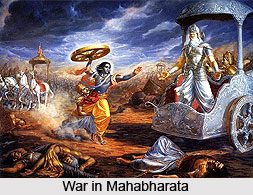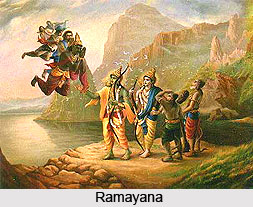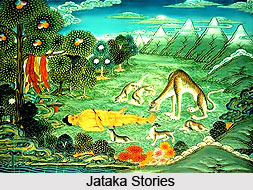 Indian Mythology encompasses a wide field of myths and legends concerning Indian religion. India is a country of diverse religious practices and socio-cultural habits which incorporates a saga of a nation with a vivid religious background. Indian Mythology takes into consideration all those myths related to Hindu, Buddhist, Jain and some other scriptures. Indian Mythology is among the richest elements of Indian culture. Vedas in India are important in shaping not only the culture but also the mythology of India. Through generations either by word of mouth or carefully stored scriptures, stories of Indian Mythology have been passed down. Indian Mythology is inseparable from Indian religion; the myths are religious accounts of Gods and Goddesses for many millions of people. The oral transmission of the stories could be trusted due to the strong religious aspects.
Indian Mythology encompasses a wide field of myths and legends concerning Indian religion. India is a country of diverse religious practices and socio-cultural habits which incorporates a saga of a nation with a vivid religious background. Indian Mythology takes into consideration all those myths related to Hindu, Buddhist, Jain and some other scriptures. Indian Mythology is among the richest elements of Indian culture. Vedas in India are important in shaping not only the culture but also the mythology of India. Through generations either by word of mouth or carefully stored scriptures, stories of Indian Mythology have been passed down. Indian Mythology is inseparable from Indian religion; the myths are religious accounts of Gods and Goddesses for many millions of people. The oral transmission of the stories could be trusted due to the strong religious aspects.
Indian Mythology in Indian Epic Poetry
Indian epic poetry is a rich reserve of epic poetry written in India and the deep seated inter relation of Indian epic poetry with Indian mythology cannot be denied. Indian mythology cannot be accounted without Hindi epic poetries. Memorable among them is Tulsidas"s "Ramcharitamanas" based on Ramayana.
 Vedic Mythology
Vedic Mythology
Indian Mythology is incomplete without the mention of Vedic mythology. The Vedic tradition refers to the Vedic rituals, religious concepts that were essential in the development and evolution of Hinduism. The Vedic culture was constructed on the ruins of the Indus Valley Civilization. Indian mythology accounts for the existence of four Vedas namely Rig Veda, Yajur Veda, Sama Veda and Atharva Veda. Vedic mythology germinated from the Vedas, also known as Vedam, which are again a component of the Hindu Shruti. Vayu, Varuna, Indra, Surya, Agni, Yama, Kubera, Soma, Mitra, Kama, Gayatri, Aditi, Ushas, Saraswati and Rudra are the Vedic Gods.
Indian Mythology in Different Religions
Indian Mythology comprises a whole lot of myths and legends associated with different religions. They are discussed below:
 Hindu Mythology
Hindu Mythology
Hindu Mythology has its origins in the Vedas and they date back to the era around 7200 BC. Hindu Mythology refers to the Indian literature which is replete with deities, divine incarnations, legends with a huge lot of philosophical discourses and moral and ethical connotations. Divine incarnation is another feature of Hindu mythology.
Religious cosmology also forms a part of the Hindu mythology, these are the ways in which evolution of the universe and its history is explained. Hindu mythology has the concept of fourteen worlds (not planets) – seven higher worlds (heavens) and seven lower ones (hells). Different deities play their part in ruling these worlds.
Jain Mythology
Jain Mythology takes account of a past and a future age or renovation of the world, and to each of these aeons are assigned 24 Tirthankaras. The mythology of the Jains is altogether different in composition. In the Jain Puranas, legends are given to account for the connexion of the Yakshas and Yakshis with their respective Tirthankaras
Buddhist Mythology
Buddhist myth originated from India. There are numerable stories of Lord Buddha"s life, which are called Jatakas. The stories have it that he was enlightened under a peepal tree, seated in a lotus posture. Hence the Buddhist Mythology is also an integral part of the Indian Mythology lending an aura of diversity to the whole system of myths and legends.









